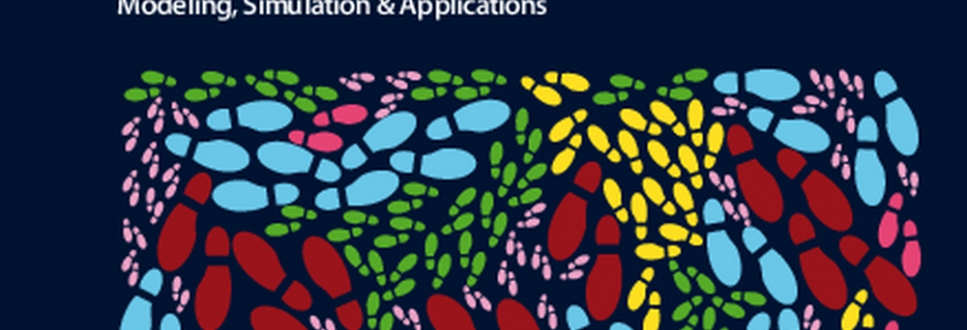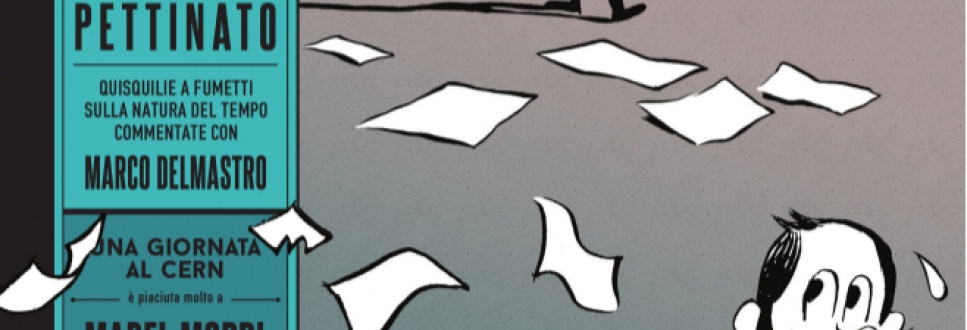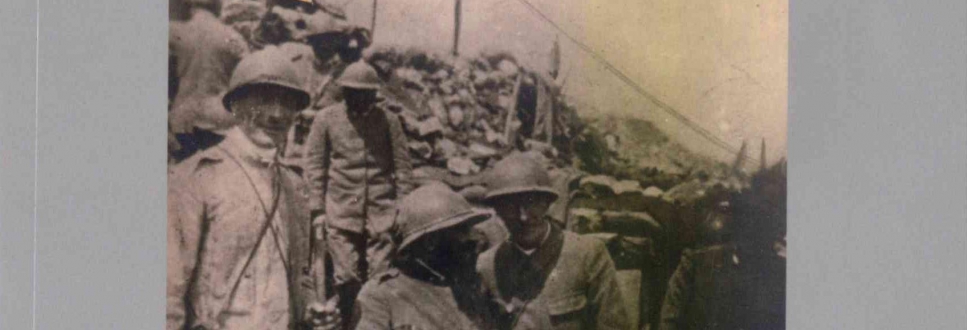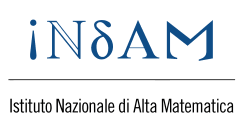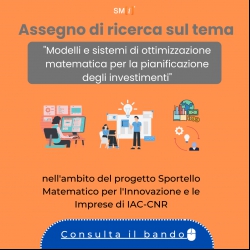
Notiziario dei Seminari di Matematica a Roma -- Settimana dal 22 al 28 ottobre 2012
2012-10-28
Notiziario dei Seminari di Matematica a Roma -- Settimana dal 22 al 28 ottobre 2012, a cura del DIPARTIMENTO DI MATEMATICA, UNIVERSITA' DI ROMA "LA SAPIENZA".
Lunedi' 22 ottobre 2012
Ore 14:30, Aula di Consiglio
Seminario di Analisi Matematica
Vladimir Maz'ya (Universita' di Liverpool)
Higher order elliptic problems in non-smooth domains
We discuss sharp continuity and regularity results for solutions of
the polyharmonic equation in an arbitrary open set. The absence of
information about geometry of the domain puts the question of
regularity properties beyond the scope of applicability of the methods
devised previously, which typically rely on specific geometric
assumptions. Positive results have been available only when the domain
is sufficiently smooth, Lipschitz or diffeomorphic to a polyhedron.
The techniques developed recently allow to establish the boundedness
of derivatives of solutions to the Dirichlet problem for the
polyharmonic equation under no restrictions on the underlying domain
and to show that the order of the derivatives is maximal. An
appropriate notion of polyharmonic capacity is introduced which
allows one to describe the precise correlation between the smoothness
of solutions and the geometry of the domain.
Martedi' 23 ottobre 2012
Ore 12:00, Aula H
Corso di Dottorato
Sergio Doplicher (Universita' di Roma I)
Meccanica quantistica, prima lezione
I. Richiami di alcuni risultati sulle Algebre di Operatori. II. Cenni
sui fondamenti storici e sperimentali. III. Teorie Quantistiche. La
formulazione C* della Meccanica Quantistica. Invarianza relativistica
e rappresentazioni covarianti. Sistemi canonici con un numero finito
di gradi di liberta', teoremi di unicita' per la rappresentazione di
Schroedinger delle relazioni di commutazione. Seconda quantizzazione.
Sistemi con infiniti gradi di liberta', regole canoniche di
commutazione e di anticommutazione, rappresentazione di Fock e sue
caratterizzazioni, rappresentazioni irriducibili inequivalenti. Campi
liberi, connessione tra Spin e Statistica. Algebre locali, postulato
di Localita'. Cenni sulla Formulazione Algebrica della Teoria dei
Campi.
Martedi' 23 ottobre 2012
Ore 12:00, Aula 311, Universita' di Roma III
COLISEUM - COntributed Lectures on Information Security Using Maths
Stefano Guarino (Universita' di Roma III)
Introduction to Quantum Computing and Quantum Cryptography
Quantum computing, first introduced by Richard Feynman in 1982, uses
quantum properties to represent data and makes direct use of quantum
mechanical phenomena, such as superposition and entanglement, to
perform operations on these data. From 1994, when Shor's algorithm
showed how to factor an integer in polynomial time on a quantum
computer, it became clear that large-scale quantum computers could
solve known "hard" problems much faster than any classical computer.
The same properties of quantum mechanics can also be used to define
new cryptographic algorithms. In this talk, we will first give an
overview of quantum mechanics and quantum systems representation. We
will define the concept of quantum bit (or qubit), describe the
properties of a system of multiple qubits and present the main quantum
gates used in quantum computers. Finally, we will show some
applications of quantum mechanical effects to cryptography, like dense
coding, quantum key distribution and quantum error correction.
Martedi' 23 ottobre 2012
Ore 14:30, Aula Dal Passo, Universita' di Roma II
Seminario di Equazioni Differenziali
Gerard Huisken (Max Planck Institute, Potsdam)
Inverse mean curvature flow and applications
Inverse mean curvature flow is a non-linear system of parabolic
evolution equations that deform a given hypersurface of positive mean
curvature in direction of its unit normal such that the inverse of the
speed equals the mean curvature of the surface everywhere. It turns
out that this flow expands the area of the surface at an exponential
rate while smoothing out and optimising certain geometric properties
of the hypersurface. The lecture describes recent applications of the
flow to isoperimetric inequalities and energy inequalities on
space-like slices of Lorentzian manifolds modelling isolated
gravitating systems in General Relativity.
Martedi' 23 ottobre 2012
Ore 15:00, Aula di Consiglio
Seminario di Modellistica differenziale numerica
Dante Kalise (Universita' di Roma I)
An efficient policy iteration algorithm for dynamic programming
Policy iteration is a well-known alternative to algorithms based on
value function iterations for the solution of optimal control problems
and differential games. In this talk we present a scheme for HJB and
Isaacs equations based on a semi-Lagrangian discretization combined
with an iterative method in the policy space with accelerated
convergence. We highlight the wide applicability of our scheme and its
efficient performance in a series of numerical tests.
Martedi' 23 ottobre 2012
Ore 16:00, Aula 311, Universita' di Roma III
Seminario di Fisica Matematica
Alessandro Pizzo (University of California at Davis)
Coulomb scattering in the massless Nelson model. Foundations of
two-electron scattering and regularity of ground-state
We construct two-electron scattering states in the infrared-regular
massless Nelson model along the lines of Haag-Ruelle scattering
theory. In order to remove the infrared cut-off, we need detailed
information about the dependence of the ground states of the fiber
Hamiltonians on the total momentum. This information is obtained with
the help of the iterative analytic perturbation theory. This is a
joint work with Wojciech Dybalski.
Mercoledi' 24 ottobre 2012
Ore 14:00, Aula B
Corso di Dottorato
Gerard Letac (Universita' di Toulouse)
Dirichlet random probabilities and applications, prima lezione
Mercoledi' 24 ottobre 2012
Ore 14:30, Aula di Consiglio
Seminario di Algebra e Geometria
Paola Cellini (Universita' di Chieti)
I politopi delle radici
Daro' una descrizione uniforme dei politopi delle radici, cioe' degli
inviluppi convessi dei sistemi di radici irriducibili.
Giovedi' 25 ottobre 2012
Ore 14:00, Aula D'Antoni, Universita' di Roma II
Dynamical Systems working seminars
Jacopo De Simoi (Universita' di Roma II)
Dynamics of some piecewise smooth Fermi-Ulam models
We find a normal form which describes the high energy dynamics of a
class of piecewise smooth Fermi-Ulam ping pong models; depending on
the value of a single real parameter, the dynamics can be either
hyperbolic or elliptic. In the first case we prove that the set of
orbits undergoing Fermi acceleration has zero measure but full
Hausdorff dimension. We also show that for almost every orbit the
energy eventually falls below a fixed threshold. In the second case we
prove that, generically, we have stable periodic orbits for
arbitrarily high energies, and that the set of Fermi accelerating
orbits may have infinite measure. This is a joint work with D.
Dolgopyat.
Giovedi' 25 ottobre 2012
Ore 14:30, Aula di Consiglio
Seminario P(n): Problemi differenziali non lineari
Luca Fanelli (Universita' di Roma I)
Disuguaglianze di Hardy relativistiche
Il principio di indeterminazione e' uno degli attributi fondamentali
della meccanica quantistica. Una sua possibile descrizione matematica
si puo' riassumere in termini della disuguaglianza di Hardy int_[R^d]
|nabla f|^2 >= (d-2/2)^2 int_[R^d] |f|^2 / |x|^2], per d >= 3 e per
ogni f C^infty a supporto compatto. La costante moltiplicativa nella
disuguaglianza precedente non puo' essere migliorata. L'obiettivo del
seminario e' introdurre un analogo relativistico della disuguaglianza
precedente, in cui il gradiente e' sostituito dall'operatore di
Dirac-Pauli ed un opportuno peso moltiplicativo porta un'informazione
riguardante l'interazione fra l'elettrone ed il campo elettrico
generato da un atomo di idrogeno. Discuteremo inoltre in che modo la
presenza di un campo magnetico assegnato puo' influenzare
quantitativamente l'indeterminazione, lasciando alcuni problemi aperti
sulla tematica "diamagnetismo vs paramagnetismo". I risultati
presentati sono ottenuti in collaborazione con L. Vega e N. Visciglia.
Venerdi' 26 ottobre 2012
Ore 12:00, Aula di Consiglio
Seminari MoMa
Adriano Barra
Collective phenomena in immune systems
The immune system defends us from pathogens. But what is an antigen?
Does each lymphocyte really know the complete ensemble of all the
molecules of our body? Is there, instead, a systemic cooperation among
these cells resembling neurons in the brain? Is the immune system
able to "think"? And, even more interesting, what is self? Is there a
sharp separation between self and not-self? From the pioneering papers
by Jerne, Varela and Couthino, the idea of a network of B-clones
interacting by exchanging antibodies was formulated as an hypothetical
way for explaining tolerance toward self proteins by mature peripheral
B-cells (beyond clonal deletion and receptor editing during the
ontogenesis). However, despite anti-antibodies are commonly
encountered, evidence in favor of an extensive network is still
lacking and even worse, always sharper experiments (e.g. the works by
Goodnow) highlighted strong evidence of a phenomenon called "anergy":
the latter shifts the responsibility of this lacking of attack by
B-cells self-directed to a lacking of signalling by helpers cells (the
second key needed for B-cell activation beyond the primary antigenic
target, self or not-self): In a nutshell, B-cells need two activation
signals, the former being the target (antigen) the latter being a
"consensus" by the helpers. Helpers do not allow this consensus and
the resulting B-cell with only one signal undergoes into a regime of
"anergy". But how can helpers recognize those B-cells self-directed?
The problem seems only shifted... Coupled to a large introduction to
theoretical immunology and its formalization through statistical
mechanics, we try to revise this discussion within a thermodynamical
framework by using the tools of disordered systems.
Venerdi' 26 ottobre 2012
Ore 14:30, Aula Dal Passo, Universita' di Roma II
Workshop "Essays in low dimensional quantum field theory"
14:30 Marcel Bischoff, Construction of models in low dimensional
Quantum Field Theory using operator algebraic methods
15:30 Coffee break
16:10 Gandalf Lechner, Equivalence of two deformation procedures in
QFT
17:10 Yasuyuki Kawahigashi, Framed local conformal nets
======================================================================
Tutte le informazioni relative a questo notiziario devono pervenire
all'indirizzo di posta elettronica seminari@mat.uniroma1.it
o nella casella della posta di Luigi Orsina, entro le ore 9 del venerdi'
precedente la settimana di pubblicazione.
Tutti coloro che desiderano ricevere questo notiziario via e-mail sono
invitati a comunicare il proprio indirizzo di posta elettronica a
seminari@mat.uniroma1.it

LINK: http://www.mat.uniroma1.it/ricerca/seminari.htmlOre 14:30, Aula di Consiglio
Seminario di Analisi Matematica
Vladimir Maz'ya (Universita' di Liverpool)
Higher order elliptic problems in non-smooth domains
We discuss sharp continuity and regularity results for solutions of
the polyharmonic equation in an arbitrary open set. The absence of
information about geometry of the domain puts the question of
regularity properties beyond the scope of applicability of the methods
devised previously, which typically rely on specific geometric
assumptions. Positive results have been available only when the domain
is sufficiently smooth, Lipschitz or diffeomorphic to a polyhedron.
The techniques developed recently allow to establish the boundedness
of derivatives of solutions to the Dirichlet problem for the
polyharmonic equation under no restrictions on the underlying domain
and to show that the order of the derivatives is maximal. An
appropriate notion of polyharmonic capacity is introduced which
allows one to describe the precise correlation between the smoothness
of solutions and the geometry of the domain.
Martedi' 23 ottobre 2012
Ore 12:00, Aula H
Corso di Dottorato
Sergio Doplicher (Universita' di Roma I)
Meccanica quantistica, prima lezione
I. Richiami di alcuni risultati sulle Algebre di Operatori. II. Cenni
sui fondamenti storici e sperimentali. III. Teorie Quantistiche. La
formulazione C* della Meccanica Quantistica. Invarianza relativistica
e rappresentazioni covarianti. Sistemi canonici con un numero finito
di gradi di liberta', teoremi di unicita' per la rappresentazione di
Schroedinger delle relazioni di commutazione. Seconda quantizzazione.
Sistemi con infiniti gradi di liberta', regole canoniche di
commutazione e di anticommutazione, rappresentazione di Fock e sue
caratterizzazioni, rappresentazioni irriducibili inequivalenti. Campi
liberi, connessione tra Spin e Statistica. Algebre locali, postulato
di Localita'. Cenni sulla Formulazione Algebrica della Teoria dei
Campi.
Martedi' 23 ottobre 2012
Ore 12:00, Aula 311, Universita' di Roma III
COLISEUM - COntributed Lectures on Information Security Using Maths
Stefano Guarino (Universita' di Roma III)
Introduction to Quantum Computing and Quantum Cryptography
Quantum computing, first introduced by Richard Feynman in 1982, uses
quantum properties to represent data and makes direct use of quantum
mechanical phenomena, such as superposition and entanglement, to
perform operations on these data. From 1994, when Shor's algorithm
showed how to factor an integer in polynomial time on a quantum
computer, it became clear that large-scale quantum computers could
solve known "hard" problems much faster than any classical computer.
The same properties of quantum mechanics can also be used to define
new cryptographic algorithms. In this talk, we will first give an
overview of quantum mechanics and quantum systems representation. We
will define the concept of quantum bit (or qubit), describe the
properties of a system of multiple qubits and present the main quantum
gates used in quantum computers. Finally, we will show some
applications of quantum mechanical effects to cryptography, like dense
coding, quantum key distribution and quantum error correction.
Martedi' 23 ottobre 2012
Ore 14:30, Aula Dal Passo, Universita' di Roma II
Seminario di Equazioni Differenziali
Gerard Huisken (Max Planck Institute, Potsdam)
Inverse mean curvature flow and applications
Inverse mean curvature flow is a non-linear system of parabolic
evolution equations that deform a given hypersurface of positive mean
curvature in direction of its unit normal such that the inverse of the
speed equals the mean curvature of the surface everywhere. It turns
out that this flow expands the area of the surface at an exponential
rate while smoothing out and optimising certain geometric properties
of the hypersurface. The lecture describes recent applications of the
flow to isoperimetric inequalities and energy inequalities on
space-like slices of Lorentzian manifolds modelling isolated
gravitating systems in General Relativity.
Martedi' 23 ottobre 2012
Ore 15:00, Aula di Consiglio
Seminario di Modellistica differenziale numerica
Dante Kalise (Universita' di Roma I)
An efficient policy iteration algorithm for dynamic programming
Policy iteration is a well-known alternative to algorithms based on
value function iterations for the solution of optimal control problems
and differential games. In this talk we present a scheme for HJB and
Isaacs equations based on a semi-Lagrangian discretization combined
with an iterative method in the policy space with accelerated
convergence. We highlight the wide applicability of our scheme and its
efficient performance in a series of numerical tests.
Martedi' 23 ottobre 2012
Ore 16:00, Aula 311, Universita' di Roma III
Seminario di Fisica Matematica
Alessandro Pizzo (University of California at Davis)
Coulomb scattering in the massless Nelson model. Foundations of
two-electron scattering and regularity of ground-state
We construct two-electron scattering states in the infrared-regular
massless Nelson model along the lines of Haag-Ruelle scattering
theory. In order to remove the infrared cut-off, we need detailed
information about the dependence of the ground states of the fiber
Hamiltonians on the total momentum. This information is obtained with
the help of the iterative analytic perturbation theory. This is a
joint work with Wojciech Dybalski.
Mercoledi' 24 ottobre 2012
Ore 14:00, Aula B
Corso di Dottorato
Gerard Letac (Universita' di Toulouse)
Dirichlet random probabilities and applications, prima lezione
Mercoledi' 24 ottobre 2012
Ore 14:30, Aula di Consiglio
Seminario di Algebra e Geometria
Paola Cellini (Universita' di Chieti)
I politopi delle radici
Daro' una descrizione uniforme dei politopi delle radici, cioe' degli
inviluppi convessi dei sistemi di radici irriducibili.
Giovedi' 25 ottobre 2012
Ore 14:00, Aula D'Antoni, Universita' di Roma II
Dynamical Systems working seminars
Jacopo De Simoi (Universita' di Roma II)
Dynamics of some piecewise smooth Fermi-Ulam models
We find a normal form which describes the high energy dynamics of a
class of piecewise smooth Fermi-Ulam ping pong models; depending on
the value of a single real parameter, the dynamics can be either
hyperbolic or elliptic. In the first case we prove that the set of
orbits undergoing Fermi acceleration has zero measure but full
Hausdorff dimension. We also show that for almost every orbit the
energy eventually falls below a fixed threshold. In the second case we
prove that, generically, we have stable periodic orbits for
arbitrarily high energies, and that the set of Fermi accelerating
orbits may have infinite measure. This is a joint work with D.
Dolgopyat.
Giovedi' 25 ottobre 2012
Ore 14:30, Aula di Consiglio
Seminario P(n): Problemi differenziali non lineari
Luca Fanelli (Universita' di Roma I)
Disuguaglianze di Hardy relativistiche
Il principio di indeterminazione e' uno degli attributi fondamentali
della meccanica quantistica. Una sua possibile descrizione matematica
si puo' riassumere in termini della disuguaglianza di Hardy int_[R^d]
|nabla f|^2 >= (d-2/2)^2 int_[R^d] |f|^2 / |x|^2], per d >= 3 e per
ogni f C^infty a supporto compatto. La costante moltiplicativa nella
disuguaglianza precedente non puo' essere migliorata. L'obiettivo del
seminario e' introdurre un analogo relativistico della disuguaglianza
precedente, in cui il gradiente e' sostituito dall'operatore di
Dirac-Pauli ed un opportuno peso moltiplicativo porta un'informazione
riguardante l'interazione fra l'elettrone ed il campo elettrico
generato da un atomo di idrogeno. Discuteremo inoltre in che modo la
presenza di un campo magnetico assegnato puo' influenzare
quantitativamente l'indeterminazione, lasciando alcuni problemi aperti
sulla tematica "diamagnetismo vs paramagnetismo". I risultati
presentati sono ottenuti in collaborazione con L. Vega e N. Visciglia.
Venerdi' 26 ottobre 2012
Ore 12:00, Aula di Consiglio
Seminari MoMa
Adriano Barra
Collective phenomena in immune systems
The immune system defends us from pathogens. But what is an antigen?
Does each lymphocyte really know the complete ensemble of all the
molecules of our body? Is there, instead, a systemic cooperation among
these cells resembling neurons in the brain? Is the immune system
able to "think"? And, even more interesting, what is self? Is there a
sharp separation between self and not-self? From the pioneering papers
by Jerne, Varela and Couthino, the idea of a network of B-clones
interacting by exchanging antibodies was formulated as an hypothetical
way for explaining tolerance toward self proteins by mature peripheral
B-cells (beyond clonal deletion and receptor editing during the
ontogenesis). However, despite anti-antibodies are commonly
encountered, evidence in favor of an extensive network is still
lacking and even worse, always sharper experiments (e.g. the works by
Goodnow) highlighted strong evidence of a phenomenon called "anergy":
the latter shifts the responsibility of this lacking of attack by
B-cells self-directed to a lacking of signalling by helpers cells (the
second key needed for B-cell activation beyond the primary antigenic
target, self or not-self): In a nutshell, B-cells need two activation
signals, the former being the target (antigen) the latter being a
"consensus" by the helpers. Helpers do not allow this consensus and
the resulting B-cell with only one signal undergoes into a regime of
"anergy". But how can helpers recognize those B-cells self-directed?
The problem seems only shifted... Coupled to a large introduction to
theoretical immunology and its formalization through statistical
mechanics, we try to revise this discussion within a thermodynamical
framework by using the tools of disordered systems.
Venerdi' 26 ottobre 2012
Ore 14:30, Aula Dal Passo, Universita' di Roma II
Workshop "Essays in low dimensional quantum field theory"
14:30 Marcel Bischoff, Construction of models in low dimensional
Quantum Field Theory using operator algebraic methods
15:30 Coffee break
16:10 Gandalf Lechner, Equivalence of two deformation procedures in
QFT
17:10 Yasuyuki Kawahigashi, Framed local conformal nets
==============================
Tutte le informazioni relative a questo notiziario devono pervenire
all'indirizzo di posta elettronica seminari@mat.uniroma1.it
o nella casella della posta di Luigi Orsina, entro le ore 9 del venerdi'
precedente la settimana di pubblicazione.
Tutti coloro che desiderano ricevere questo notiziario via e-mail sono
invitati a comunicare il proprio indirizzo di posta elettronica a
seminari@mat.uniroma1.it



